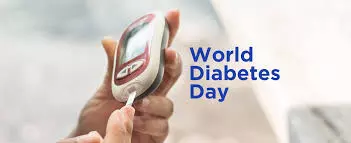
The Diabetes Association of Nigeria says no fewer than 11.2 million Nigerians are presently living with the disease.
Dr. Alkali Mohammed, President of the association, revealed this on Monday in Abuja at an event to commemorate 2023 World Diabetes Day (WDD).
Supreme News reports that the WDD is a day set aside by the UN to draw public attention to the need for action to fight the menace of diabetes.
It is also a day designed and celebrated to raise awareness about the disease as a global public health issue and what needs to be done collectively and individually to manage of the condition or prevent it
The 2023 commemoration has as its theme, “Access to diabetes care.”
Mohammed explained that out of the 11.2 million Nigerians living with diabetes, 90 per cent of them had type 2, adding that the disease could affect any part of the body.
He also disclosed that about 537 million people were recorded living with disease globally.
He added that it had been projected that the figure could increase to 737 million by 2040 if nothing was done to curb the disease.
Mohammed, however, advocated for an increased tax on sugar-sweetened beverages (SSBs) products from 10 percent to 20 percent, noting that the tax would improve the health culture and environment by discouraging the consumption of sugary products.
He also said that the tax would help raise some revenue for the government.
The president, however, said that the government had not been able to explain what the 10 percent tax from SSBs was being used for.
“The government does not fund the control and management of non-communicable diseases (NCDs), including diabetes, due to what it termed a paucity of funds,” he said.
He, therefore, appealed to the government to use at least 60 percent of the tax generated for public enlightenment, prevention, and subsidising of drugs, especially for diabetes patients.
Mohammed also called for the enrollment of some Nigerians with NCDs in the health insurance scheme.
Meanwhile, the National Action on Sugar Reduction (NASR), a coalition, has said that a diabetic patient spends not less than N300, 000 annually on medication.
Dr. Alhassan-Adamu Umar, Chairman of the Coalition, says that diabetes indirectly costs Nigeria about 4.5 billion dollars a year.
The coalition, however, said that there was a need for Nigeria as a country to take proper action to curtail the risk posed by NCDs from the consumption of SSBs.
“In Nigeria, most of the payment we make for healthcare is out of pocket, so if you add the total costs of all the complications that affect any part of the body together with the the cost of living, it is a huge cost.
“The second component is the fact that people become less productive when they lose their eyesight or, when they are sick, they don’t go to work.
“If the head of the family or the mother is diabetic and she cannot see, some members of the family that could have been productive elsewhere would be tied down to supporting them.
“You can see that this sickness has a multi-factorial component on the family at large, and the amount you envisage you will spend on the sickness could be more than that,” he said.
Umar also said that Nigeria had the highest burden of diabetes in Africa.
According to him, diabetes is underreported, and some people are living with the disease without knowing they have it, so the number we have today may be higher because some people don’t know they are living with the disease.
“An event like this is an eye-opener for policymakers to do the needful, increase awareness of what we eat and drink, and reduce the burden of NCDs, especially diabetes,, which has a lot to do with our lifestyles.
“We want proper implementation of policy and proper usage of the tax deduction from SSB productss for the the betterment of the lives of diabetic patients,” he said.
Supreme News further reports that NASR coalition is a group of health organisations advocating for policy to curtail the consumption of SSBs linked to non-communicable diseases like type 2 diabetes, cancer, and hypertension.



